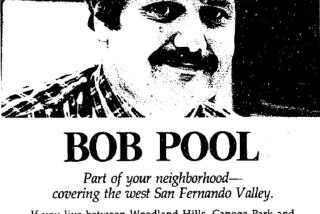A Word-Perfect Career at the New Yorker
- Share via
The beginning writer can scarcely do better than to read, study and take to heart this book. Or the accomplished writer, for that matter.
In “Friends Talking in the Night,” Philip Hamburger has much to teach us about how to use modern American English to instruct, delight and to make the reader laugh out loud. Now 84, he went to work at the New Yorker in 1939. Since then, he writes:
“I have wandered all over its pages and have also wandered all over the map--from the vibrant sidewalks of New York to the melancholy pampas of Argentina, from a conversation with Dwight Eisenhower in Gettysburg, Pa., to Hitler’s aerie in Berchtesgaden.”
And--oh joy for a writer--”always with complete freedom to go where I wished and write as I pleased.”
The pieces in this book are all taken from the pages of the New Yorker. Some are criticism: Hamburger served for a year as a music critic; two years as television critic, when the medium was in its childhood; and, in the summers, as a fill-in movie critic. Most of the pieces, though, are just plain reporting, done with an elegance and wit that restores luster to that threadbare trade. Here is Hamburger, for instance, recalling in 1983 how he went 50 years earlier to Washington for Franklin D. Roosevelt’s first inauguration on March 4, 1933:
“Thirteen million Americans were out of work (including my own father); thousands of families were living in makeshift shacks in our greatest cities; farmers were rioting to prevent foreclosure of their land and homes; hunger was commonplace . . . I was lucky; I had a scholarship that credited so many hours of work in the library against so much tuition. I was young and healthy and had my share of dreams.”
That last sentence is typical of Hamburger; it snaps shut on the paragraph like the tight-fitting lid of a well-made wooden box. It says just enough, and lets you know that by the end of the piece he will have conveyed to you the great emotion of that day when the new president revived the nation’s own dreams in saying, “ . . .the only thing we have to fear is fear itself.”
What Hamburger knows in his bones is that a good reporter simply reports what he sees and hears. Here is his portrayal of a 1948 Metropolitan Opera production of one of Verdi’s most popular works:
“The Metropolitan laid another of its big, heavy eggs last week with the first subscription ‘Rigoletto’ of the season. I was more puzzled than pained by the performance. The question that came to mind was: How is it possible to make ‘Rigoletto’ sound dull, thick, interminable, sticky and sick? Little boys playing airs from ‘Rigoletto’ on combs could gather crowds on a side street any day. Organ grinders who turn their instruments over to ‘La donnae mobile’ run the risk of suffering contusions of the scalp from the 50-cent pieces dropped on their heads. But leave ‘Rigoletto’ to the Metropolitan and the trick is miraculously done.” The blame lay largely, Hamburger wrote, with the soprano Lily Pons, who sang Gilda. Pons, he wrote, “should be seen and not heard.”
In June of 1941, Hamburger went to a dog show to see the basenjis, the barkless dogs from the then-Belgian Congo. He found them “in a far corner of one of the tents, quietly watching a fat poodle being sprayed with an atomizer. The Basenjis had satiny brown coats and the build of fox terriers; their faces bore the wrinkled, worried expression of investment counsellors.”
That last clause is vintage Hamburger, a surprise that delights and describes and makes us laugh. “Friends Talking in the Night” is a book, to use Hamburger’s description of an assignment he had, “meant to be read at one’s leisure and enjoyed.”
More to Read
Sign up for our Book Club newsletter
Get the latest news, events and more from the Los Angeles Times Book Club, and help us get L.A. reading and talking.
You may occasionally receive promotional content from the Los Angeles Times.









